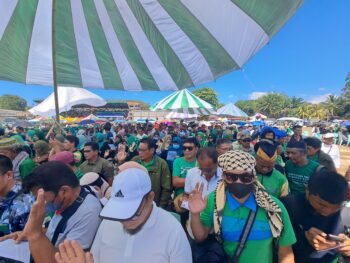GENERAL SANTOS CITY (MindaNews/05 Dec.) — The Department of Labor and Employment (DOLE) in Region 12 has released livelihood packages to families of 56 former child laborers at the small-scale mining areas of T’boli town in South Cotabato as it moves to totally eliminate the cases of child labor in the area.
Ofelia Domingo, DOLE Region 12 director, said the livelihood grants were part of the interventions earlier committed by the agency to help address the persistent problem on child labor at the gold rush village of Kematu in T’boli.
She said the 56 beneficiaries were parents of identified child laborers who were previously employed in illegal “banlas” or sluice mining operations in the area.
Banlas mining, which is considered a highly-destructive mining method, involves the pouring of large amounts of water using high-pressure water jets on a mountain’s surface to extract the rocks containing the gold ore, and then pan them with mercury.
The use of the illegal mining method has increased in the last several years in small-scale mining areas in Barangays Kematu and Desawo in T’boli.
“We have determined that one of the best ways to relieve these children of the burden of earning a living to contribute to their family’s income is to empower the parents themselves,” Domingo noted in her report to Labor Secretary Rosalinda Baldoz.
The official said four of the parents received livelihood starter kits for home-based bead-making business; two got beauty parlor sets consisting of manicure, pedicure, and foot spa kits; nine had starter kits for dress-making; and, 41 were given starter kits for food business ventures.
Domingo said the livelihood packages, which were worth P10,000 each, were given to the beneficiaries following an assessment of their skills and interests.
“We gave them the livelihood they know best. They’re now engaged in income-generating home businesses,” she said.
Cases of child labor have persisted in Kematu since last year despite a ban imposed by the local government on child labor in mining activities.
Village officials earlier reported that a number of small-scale mining operators in the area have continued to employ minors for their operations.
But most of the pool of child laborers reportedly came from areas outside of Kematu, which passed a resolution and an ordinance in May last year prohibiting the deployment of minors and underage children within the village’s mining sites.
The measure, which was endorsed by the local government of T’boli, called for the full enforcement of such prohibition in the area.
Barangay Kematu was earlier identified by DOLE central office as among the eight villages in Region 12 as “child labor areas.”
The other areas were barangays Malire of Antipas, Cadungon and Saguing of Makilala, Presbitero of Pigkawayan, all in North Cotabato as well as barangays Lagao, San Isidro and City Heights in this city.
The Provincial Council for the Protection of Children of South Cotabato, which is backed by DOLE and the Department of Interior and Local Government, said the child laborers worked as “abanteros,” packers and haulers in small-scale mining projects. (MindaNews)
